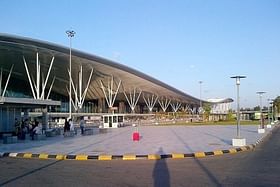The Kempegowda International Airport in Bengaluru has recently revealed a monumental rise in passenger numbers over the course of the past year.
The airport has experienced a 96 per cent growth in passenger numbers during 2022-23 compared to the previous financial year.
In total, a staggering 31.91 million passengers have travelled through the airport, with 28.12 million being domestic passengers and 3.78 million being international passengers.
This significant increase can be attributed to the resumption of post Covid-19 pandemic operations, as well as the re-introduction of key routes and the initiation of new routes linking leading business hubs and travel destinations.
Moreover, the airport has maintained its standing as the number one airport in India for processing perishable cargo for the second consecutive year, as well as ranking third for handling international cargo since August 2022.
Meanwhile, several important milestones have been celebrated over the past year, including Akasa’s growth story, Qantas Airways recent-service to Sydney, and Emirates’ daily Airbus A380 services to Dubai.
The airport’s success is not confined solely to passenger numbers, however. The recovery in air transport movements has been equally impressive, with a 50.8 per cent overall growth in FY23.
Furthermore, several international airlines have reinstated their operations from Bengaluru, with major carriers such as Cathay Pacific and Malindo Air commencing flights on the Bengaluru-Hong Kong and Bengaluru-Kuala Lumpur routes respectively.
Jazeera Airways has also recently launched flights on the Bengaluru-Kuwait route, whereas Qantas Airways has announced that it will commence four weekly non-stop Bengaluru-Sydney flights.
On the domestic front, the airport has welcomed Akasa Air, which launched operations from the airport with 25 daily departures to nine cities across India.
Interestingly, Akasa Air, which only launched its operations eight months ago, has already managed to capture 10 per cent market share of the airport’s domestic operations.
IndiGo remains the leading domestic airline from the airport, with 57 per cent market share, followed by the Tata Group airlines, which boast a total market share of 27 per cent.
Satyaki Raghunath, the chief strategy and development officer of Bengaluru International Airport Limited (BIAL), explained the benefits of the recent addition of Terminal 2 (T2), which has helped the airport consolidate its position as the preferred gateway to South and Central India, as per a Times Of India report.
Garden Terminal For Garden City
T2 is built on the premises of ‘sustainability’, ‘technology’, ‘innovation’ and ‘art’.
In October 2018, BIAL awarded the contract to L&T’s buildings and factories business for construction of the T2. The contract includes design, procurement, engineering, construction, testing and operations of Terminal 2.
American architectural firm Skidmore, Owings & Merrill (SOM) was selected for providing the design of the terminal. It chose a design for the terminal to reflect the ethos of Bengaluru as a garden city.
Billed as the garden terminal, it features trees, small gardens and ponds.
Passageways throughout the terminal will connect the passengers with nature. The ceiling at the entrance, check-in and security area will feature hanging planted bells.
The new terminal will also feature a large indoor garden with rammed-earth walls and waterfalls, which will act as a gateway into the densely-landscaped retail area.
The three-storeyed forest belt is set to offer a unique outdoor experience for arriving and departing passengers. It will be well connected to the shopping area. The forest belt will be viewable from all main indoor spaces.


